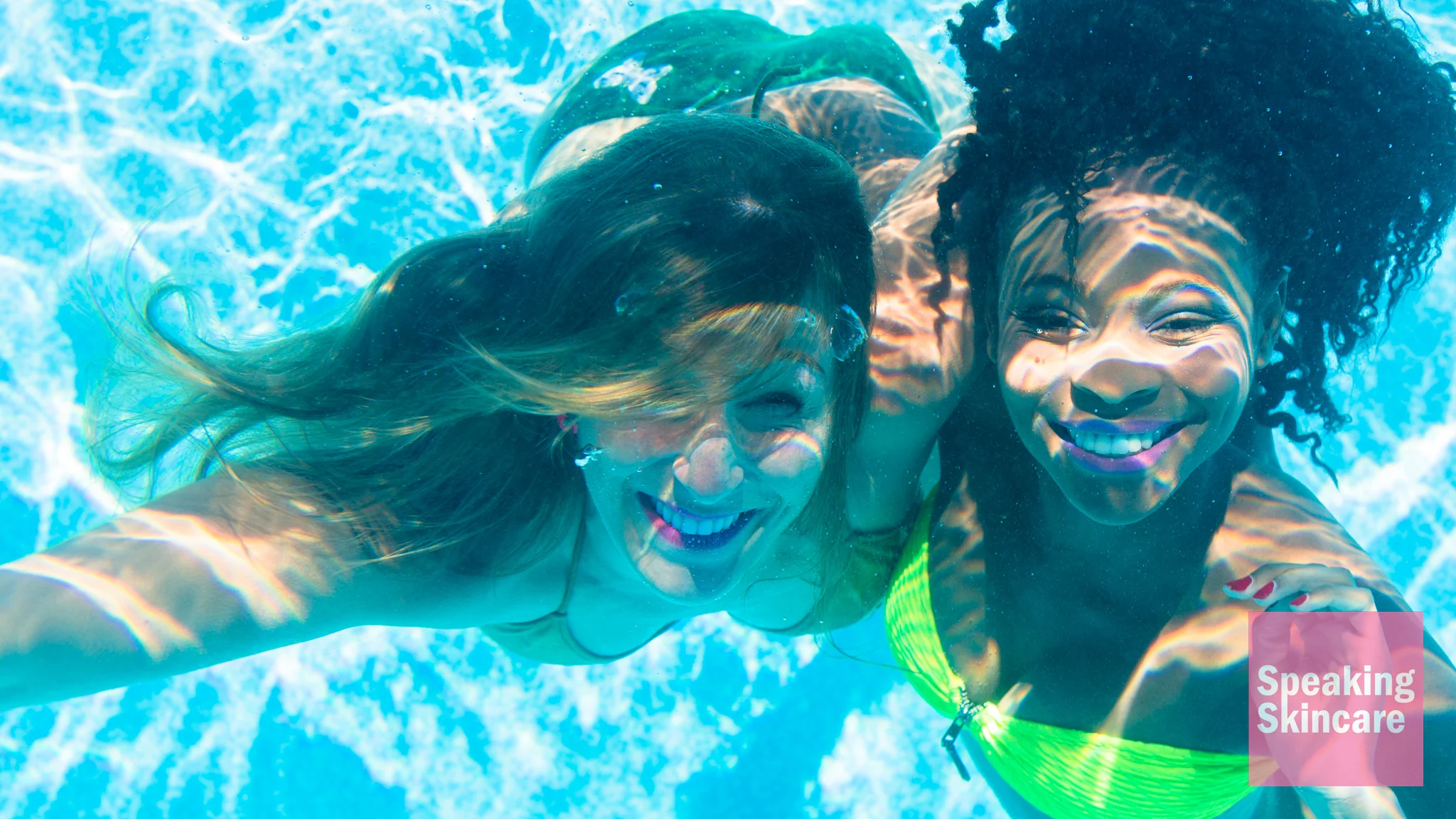We all love chilling in a pool from time to time. Whether we’re just relaxing on a nice day, or trying to get some exercise by swimming, there are few things that feel better.
However, the chlorine present in swimming pools can leave our skin dry, wrinkled, and smelling of chemicals, and turn our hair into straw. So what’s the best way to remove it and protect our skin and hair for the future?
What does chlorine do to the skin?
Chlorine is added to swimming pools in order to kill germs. Since a lot of people use pools over a short period of time, there can be a lot of nasty bacteria in there that can be harmful to swimmers if swallowed. The chlorine fights these germs, which can include salmonella, by turning into a mild acid called hypochlorous acid.
Unfortunately, while chlorine is essential for making the swimming pool a safe environment, it can be really annoying for our skin and cause some issues. Basically, the hypochlorous acid from the chlorine has an immense drying effect and removes a lot of the skin’s natural oils. Couple that with the fact being in the water opens up our pores, and this is the recipe for some rather frustrating forms of skin irritation, including itchiness, redness, and in some cases, rashes.
Your hair doesn’t escape these problems either, as the chlorine severely dries out the follicles and washes away the scalp’s natural oils. This can leave the hair feeling rough, brittle, and extremely dry.
Finally, to add the cherry to the cake, chlorine leaves an unpleasant smell on our skin that seemingly lasts all day long. Have you ever found yourself frantically scrubbing away in the shower after a swim and not being able to get rid of the smell? We feel you.
How to remove chlorine from your hair
Unless you’re planning on wearing a swim cap, you’ll likely be getting a lot of chlorine in your hair. Here are some great techniques to effectively wash chlorine from your hair.
Wet hair before going in the pool
Before we get to them though, here’s a great and easy preventative measure you can take to protect your hair from chlorine damage. Be sure to sufficiently wet your hair just before you dive into the pool. Don’t wash it with shampoo or conditioner, simply stand under a shower for a minute and get it nice and drippy. Your hair is a big sponge and absorbs moisture, so if the hair is already full of clean water, it will make it harder for a lot of chlorine to attach itself. Sounds too easy to be true, but trust us, it helps.
Rinse hair straight away
The key to effectively washing away chlorine from the hair is speed. As soon as you step out of the pool, stand under a shower immediately. Resist the urge to lounge around and take it easy, because then the chlorine will only embed itself more. Find a poolside shower or another source of clear water and start rinsing straight away. If you have access to specialist chlorine-removal products, lucky you, but if not, just keep rinsing and thoroughly comb the hair once done.
Don’t blow-dry the hair
Since chlorine can have a powerful drying effect, it’s much better to let your hair dry naturally rather than using a blow dryer. Using a blow-dryer will put the hair under more unnecessary stress and could actually make the symptoms of dryness worse, which could cause damage. Just take it easy and let nature do its thing.
How to remove chlorine from skin
Since chlorine can dry and wrinkle the skin, it’s important to go easy on the skin when washing. Here are some easy and simple methods.
Avoid using hot water
Your skin will already be lacking its natural oils and will therefore be quite dry, so the last thing you’ll want to do is shower with hot water. Hot water can irritate and damage the skin. It can also cause excess dryness, which isn’t what you want when your skin is already dry. Instead, shower with lukewarm water. This won’t upset the skin or cause a reaction and will help to soothe the surface layers.
Use Vitamin C
Vitamin C is a powerful ingredient that can help to neutralize the chlorine in the skin in a natural way. If you don’t have any Vitamin C-heavy skincare products, you can easily make a homemade version that will work just as well. Purchase some Vitamin C crystals and mix a teaspoon amount into a spray bottle with water. Spray on your body while showering and rub it into the skin, and it won’t be long until the chlorine and the smell are gone. Nifty, right?
Moisturize
Since the skin will be lacking in oil, using a rich moisturizer after a shower is the best way to return the skin back to a healthy balance. The ingredients in the moisturizer will be absorbed into the skin, and help the layers retain vital water which will alleviate dryness and tightness.
Conclusion
Chlorine is essential for keeping swimming pools clean and safe, but it can have a detrimental impact on hair and skin. Avoid harsh products and restore moisture to keep skin healthy after being exposed to chlorine. If necessary, take preventative measures before entering a pool to lessen the impact of the hypochlorous acid.
